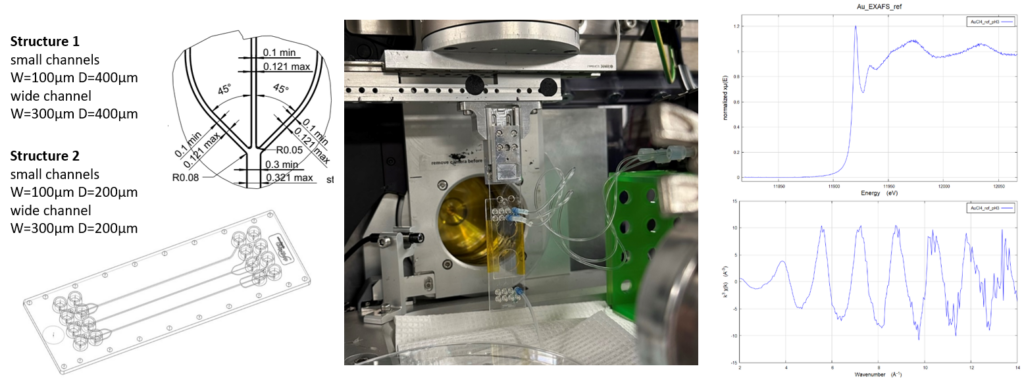AdaptoCell is a microfluidic sample environment available to academic and industrial users. AdaptoCell is available to users at Balder (X-ray absorption spectroscopy; contact Kajsa) and CoSAXS (small angle X-ray scattering; contact Ann), and under development at BioMAX/MicroMAX (serial crystallography; contact Monika). The platform allows for different types of studies of liquid samples under flow in microfluidic channels.

One of the main advantages of having the sample under flow is to minimize the risk of radiation damage as the sample volume hit by the X-ray beam is continuously refreshed. Other advantages include small sample volume and the possibility to perform time-resolved experiments such as in situ mixing.
Microfluidic devices
Different microfluidic devices are available depending on the specific needs of the experiments. Both commercial polymer microfluidic chips (from Microfluidic ChipShop) and adapted custom-made devices in other materials such as glass-silicon-glass (in collaboration with Customized Microfluidics, Uppsala University) are available. Example of designs available are straight channels, hydrodynamic flow focusing channels, droplet generators and mixing channels. A special designed COC polymer co-flow chip for XAS and SAXS with different channel depth is available at MAX IV (see below for use at Balder).

Beamline stations and off(beamline) test station
To control the flows in the microfluidic channels users can select to use either a pressure driven flow system with flow sensors (Elveflow) or high precision syringe pumps (Cetoni). Various microfluidic accessories e.g. valves, T-junctions and connectors are also available.
For mounting the chips at the beamlines microfluidic chip holders are available. At CoSAXS the chip holder has integrated heating to allow for experiments at 37° C.
In the biological support lab there is an off(beamline) test station equipped with an optical microscope available for users to test their systems before the beamtime. In the biological support lab there is also equipment available to test the samples before and after the experiments using other techniques e.g. DLS and UV-vis.

Project members
For more information please contact the project team.
| Dr. Kajsa Sigfridsson Clauss | PI, Balder MAX IV |
| Dr. Anna Fornell | Alumni, Postdoc, MAX IV |
| Dr. Yang Chen | Bio and Chem lab manager, MAX IV |
| Dr. Ann Terry | Researcher, CoSAXS MAX IV |
| Monika Bjelcic | Postdoc, MicroMAX MAX IV |
| Dr. Ross Friel | Researcher, Halmstad University |
| Dr. Laurent Barbe | Researcher, Uppsala University |
| Dr. Pushparani Micheal Raj | Alumni, Postdoc, MAX IV |